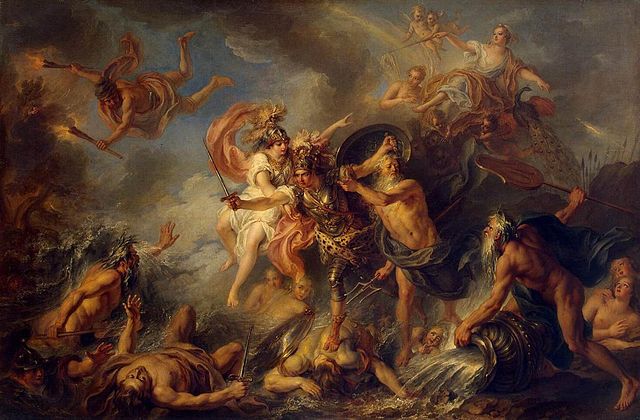Wednesday
A new book has been released with a subject that is very close to my heart: literature about anger. I have argued that few works deal with anger better than Beowulf, which shows both a range of angers and what it takes to counter their destructive effects. In her recently released Enraged: Why Violent Times Need Ancient Greek Myths, however, Emily Katz Anhalt points out that Homer also does a pretty good job in The Iliad, as does Sophocles in Ajax and Euripides in Hecuba.
According to Mary Beard’s New York Times review, Anhalt
offers an engaging and sometimes inspiring guide to the rich complexities of the Iliad. Her underlying point is that, from its earliest origins, Western literature questioned the values of the society that produced it. The Iliad is no jingoistic Greek anthem, proudly celebrating the achievements of its warrior heroes and their struggles for military, political and personal glory (their struggles, as she sums it up, to be “best”). The poem both encapsulates and simultaneously challenges that worldview, by asking what “bestness” is and what the costs of such a competitive culture are.
Anhalt shows that The Iliad is radical in the way that it humanizes the enemy. Beard observes,
As Anhalt rightly insists, by setting some of his scenes behind enemy lines, among the Trojan fighters and their families — from the ruminations of the sadly regretful Helen to the encounters between Hector, the Trojan super-warrior, and his young son — Homer destabilizes the traditional “them-and-us” culture of the ancient Greek world, and its conventional polarization between civilization and barbarity. We are invited to see the Trojan enemy not as barbarians at all but as people very much like us (that is, like Greeks): laughing and joking, loving their children, kindly, fearful and in awe of their gods. In short, as Anhalt writes, the first work of Western literature already reminds us that even a sworn enemy is “fully human.”
Then the author applies the lesson to our own times:
Anhalt, however, has bigger points to make. She wants to show that the Iliad and other works of Greek literature (she also examines in detail two fifth-century-B.C. Athenian tragedies set in the last days and aftermath of the Trojan War) have direct lessons for the modern world. You can see why. As she makes very clear, dehumanizing the enemy is still one of the most counterproductive aspects of political rhetoric. It may suit some narrowly short-term ends to pretend that, for example, the politicians and people of North Korea do not laugh and joke and love their children; but of course they do.
In her chapter on Sophocles’s Ajax, meanwhile, Anhalt lays out some of the limitations of group decision making. The awarding of Achilles’s armor to Odysseus, even though Ajax has been the greater warrior, drives Ajax mad with anger:
After his death, the armor of Achilles was unfairly awarded as a prize to Odysseus, not to his rival Ajax — and bloody mayhem came from Ajax’s rage at the decision. Anhalt urges us to look harder, as Sophocles did, at the way democracy works, to face the uncomfortable fact that democratic decisions can be wrong and can sometimes serve the ends of tyranny and ignorance rather than of justice and equality. Her implication that it is the job of a democracy to debate and to deal with democracy’s mistakes as well as to celebrate its successes is important…
In my book How Beowulf Can Save America, I argue that each of the three monsters that Beowulf kills represents a different kind of anger and that Beowulf, in marked contrast to other characters, models an effective response to dealing with each anger. Anhalt doesn’t appear to search within her three texts for antidotes, or at least Beard doesn’t mention any. They do exist, however.
For instance, when Achilles uses revenge therapy to deal with the death of Patroclus, it brings him no peace and even the gods are horrified by his brutality. He then, however, moves to a softer place upon witnessing the grief of Priam, whose son Hector he has killed. By allowing Priam to take Hector’s body, Achilles appears a bigger man than he was when slaughtering Trojans. This is a very human lesson that Homer teaches us.
Beard is disappointed that Anhalt doesn’t offer us better solutions to the problem of violence other than the vapid dictum “it is better to talk about things than fight.” I’m thinking that maybe Anhalt didn’t dig deep enough. When great literature introduces us to a problem, it generally offers up constructive responses.
